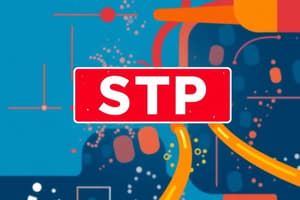Podcast
Questions and Answers
What is the primary purpose of the Spanning Tree Protocol (STP)?
What is the primary purpose of the Spanning Tree Protocol (STP)?
- To increase the bandwidth in a network
- To manage IP addressing within a VLAN
- To enhance the speed of data transmission
- To prevent loops in a network topology (correct)
Which of the following is a key enhancement to STP that allows for faster convergence times?
Which of the following is a key enhancement to STP that allows for faster convergence times?
- Rapid STP (RSTP) (correct)
- PortFast
- MSTP
- Per-VLAN Spanning Tree (PVST)
In STP, what is the role of the Root Bridge?
In STP, what is the role of the Root Bridge?
- To serve as the central point for all spanning tree calculations (correct)
- To distribute network addresses
- To block all data packets
- To forward data to all ports simultaneously
What is an Alternate (Blocked) Port in the context of STP?
What is an Alternate (Blocked) Port in the context of STP?
Which protocol is used for redundant paths and loops in a topology without blocking ports?
Which protocol is used for redundant paths and loops in a topology without blocking ports?
What is the primary function of a Bridge Protocol Data Unit (BPDU)?
What is the primary function of a Bridge Protocol Data Unit (BPDU)?
What does the term 'Forward Delay' refer to in STP?
What does the term 'Forward Delay' refer to in STP?
Which spanning tree enhancement allows for multiple VLANs to be managed by a single instance?
Which spanning tree enhancement allows for multiple VLANs to be managed by a single instance?
What is the main purpose of STP?
What is the main purpose of STP?
Which version of STP provides a separate spanning tree instance for each VLAN?
Which version of STP provides a separate spanning tree instance for each VLAN?
Which additional features does PVST+ support?
Which additional features does PVST+ support?
How must switches be configured to run the rapid spanning tree protocol?
How must switches be configured to run the rapid spanning tree protocol?
Which version of STP is referred to as the original standard?
Which version of STP is referred to as the original standard?
What is the main characteristic of CST in STP implementations?
What is the main characteristic of CST in STP implementations?
Which Cisco IOS version runs PVST+ by default?
Which Cisco IOS version runs PVST+ by default?
What does the abbreviation RSTP stand for in the context of STP?
What does the abbreviation RSTP stand for in the context of STP?
What is the first step in the process of building a loop-free topology using STP?
What is the first step in the process of building a loop-free topology using STP?
Which type of ports does STP designate as alternate or blocked in the event of a loop?
Which type of ports does STP designate as alternate or blocked in the event of a loop?
In a three switch network configured with STP, which aspect is not demonstrated when STP is disabled?
In a three switch network configured with STP, which aspect is not demonstrated when STP is disabled?
When investigating STP operations, what is the primary objective of observing STP in a network?
When investigating STP operations, what is the primary objective of observing STP in a network?
What happens during the election of the root port in an STP configuration?
What happens during the election of the root port in an STP configuration?
Which concept does not directly relate to the functions of STP?
Which concept does not directly relate to the functions of STP?
What is the primary benefit of using STP in network configurations?
What is the primary benefit of using STP in network configurations?
During the STP process, what occurs after the root bridge is elected?
During the STP process, what occurs after the root bridge is elected?
Flashcards
Spanning Tree Protocol (STP)
Spanning Tree Protocol (STP)
Protocol that ensures a loop-free network topology in networks with redundant links.
Rapid STP (RSTP) & MSTP
Rapid STP (RSTP) & MSTP
Enhancements to STP offering faster convergence and better handling of complex networks.
Layer 3 Routing
Layer 3 Routing
Routing at Layer 3 allows redundant paths and loops without port blocking, enhancing network flexibility.
STP (IEEE 802.1D)
STP (IEEE 802.1D)
Signup and view all the flashcards
Per-VLAN Spanning Tree (PVST+)
Per-VLAN Spanning Tree (PVST+)
Signup and view all the flashcards
Bridge Protocol Data Unit (BPDU)
Bridge Protocol Data Unit (BPDU)
Signup and view all the flashcards
Root Bridge
Root Bridge
Signup and view all the flashcards
Forwarding and Discarding States
Forwarding and Discarding States
Signup and view all the flashcards
PVST+
PVST+
Signup and view all the flashcards
Rapid STP (RSTP)
Rapid STP (RSTP)
Signup and view all the flashcards
Multiple Spanning Tree Protocol (MSTP)
Multiple Spanning Tree Protocol (MSTP)
Signup and view all the flashcards
Root Port
Root Port
Signup and view all the flashcards
Designated Port
Designated Port
Signup and view all the flashcards
Alternate Port
Alternate Port
Signup and view all the flashcards
Study Notes
Spanning Tree Protocol (STP) Overview
- STP provides a loop-free network topology, crucial for networks with redundant links.
- Enhancements like Rapid STP (RSTP) and Multiple Spanning Tree Protocol (MSTP) adapt STP for increased complexity and redundancy.
Layer 3 Routing
- Layer 3 routing enables the creation of redundant paths and loops without blocking ports.
- Many environments are moving towards Layer 3 for their networks, except in access layer switch connections.
Key Terms and Concepts
- Spanning Tree Protocol (STP): Original loop prevention protocol defined by IEEE 802.1D.
- Per-VLAN Spanning Tree (PVST+): Cisco's version, allows individual spanning tree instances for each VLAN.
- Bridge Protocol Data Unit (BPDU): Messages exchanged between switches to maintain loop-free topology.
- Root Bridge: Central switch that acts as the point for all spanning tree calculations.
- Forwarding and Discarding States: STP port states determine data flow; ports can forward data or block traffic to prevent loops.
STP Operation Process
- STP builds a loop-free topology in four steps:
- Elect the root bridge.
- Designate root ports.
- Identify designated ports.
- Determine alternate (blocked) ports.
Versions of STP
- STP (IEEE 802.1D): Basic implementation allowing for a single spanning tree across all VLANs.
- PVST+: Enhances STP by creating separate trees for each VLAN, supporting features like PortFast and BPDU guard.
- Rapid STP (RSTP): Speeds up convergence compared to traditional STP; requires explicit configuration on switches.
- Multiple Spanning Tree Protocol (MSTP): Allows multiple VLANs to be mapped to a single spanning tree for efficiency.
STP Configuration
- Cisco IOS 15.0 and later default to PVST+ for enhanced functionality.
- Switches need to be specifically configured to enable RSTP mode for optimal performance.
Educational Activities
- Practical exercises such as observing STP operations and configuring networks in simulations (like Packet Tracer) can reinforce learning about STP functionality and loop prevention methods.
Studying That Suits You
Use AI to generate personalized quizzes and flashcards to suit your learning preferences.




